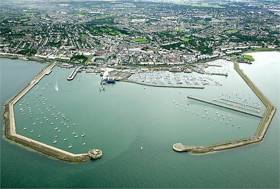Displaying items by tag: Ports Transfer
Transfer of Dún Laoghaire Harbour: Councillors’ Concerns At Liabilities
#PortTransfer - County councillors writes The Irish Times from all the main parties of Dún Laoghaire-Rathdown have expressed concern at potential financial liabilities involved in taking over responsibility for Dún Laoghaire Harbour.
The debate on due diligience issues as Afloat previously covered took place at a council meeting on Monday (last night). Councillors unanimously agreed “serious risks for the local authority” had been raised in a due diligence report commissioned by the council into the position of Dún Laoghaire Harbour Company.
Under the provisions of the Harbours Act 2015, (see National Ports Policy) responsibility for the harbour is due to be transferred from the Department of Transport to the local authority.
‘Urgent need’
However, Fianna Fail councillor Mary Hanafin said the due diligence report had identified “an urgent need for a risk assessment” in almost every area of the harbour company’s operations.
She said issues were raised about pension liabilities, legal costs, ownership of assets and liability for the repayment of grants which had been paid to the harbour company.
She told the meeting the grants could be as high as €112 million, and “the liabilities for clawback are absolutely potentially enormous”.
Fellow Fianna Fáil councillor Shay Brennan said taking over the harbour company could see its debts transferred to “every household between Dún Laoghaire and Dundrum”.
Fine Gael councillor John Bailey said the council wanted democratic control over the harbour, but not the liabilities of the harbour company - the scale of which he said was unknown.
He called for certified, audited accounts from the harbour company. “There is no way we are taking on this liability, I want the harbour but this is an absolute joke,” he said.
“Where are the audited accounts for 2015?”
Cllr Barry Ward of Fine Gael called for the dissolution of the harbour company before responsibility for the harbour is transferred to the council.
He said the council did not want a subsidiary company, because this would prevent “any oversight and governance” by the elected members.
He said the harbour company should be dissolved before the harbour comes under democratic accountability.
People Before Profit councillor Melisa Halpin also expressed concern over the due diligence report, saying councillors had been waiting 20 months to find out what the issues were.
She said there were “major questions” which remained to be asked in a risk assessment.
For more on the story including 'favouring dissolution' as discussed in the council chamber, click here.





























































